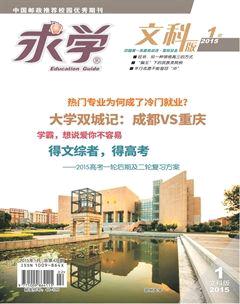“ing”的奇境记
周童瑜

看到ing,也许你的脑海会认为它就是一个表示进行时的标志,或者干脆用非谓语动词的一种来将其概括。但实际上,它的用法在语法中就像一个个奇境,想要完全吃透得费一番气力。下面我们就通过例句来看看“ing”的奇境到底有哪些。
奇境记一:时态之境
ing在时态中,主要有过去、现在和将来三种进行时,我们通过两道题来将其“秒杀”。
1. —Oh, dear. I forgot the air tickets. —You
______ something.
A. have left B. are always leaving
C. are leaving D. always left
2. —Hey, look where you are going? —Oh, I'm terribly sorry, _____.
A. I'm not noticing B. I wasnt noticing
C. I haven't noticed D. I dont notice
解析:第1题选B,表示习惯性动作,丢三落四。第2题选B,表示刚才未留意。
时态之境也涉及ing式的被动态,如:I heard of his having been chosen to be the coach of the team. have加ing是受到介词of的影响, 使用完成式结构是强调chosen的动作发生在heard之前。
奇境记二:状语之境
ing在状语中,主要涉及伴随状语、时间状语、原因状语、让步状语和结果状语。伴随状语:They went out of the classroom, talking and laughing. 时间状语:Having been shown the lab, we were taken to see the school library. 原因状语:Being ill, he didnt go to school yesterday. 让步状语: Knowing all this, they made me pay for the damage. 结果状语:His father died, leaving him a lot of money. ing式作结果状语通常表示谓语动词的直接结果,是意料中的结果。 请看一道题目:
3. European football is played in 80 countries, _____it the most popular sports in the world.
A. making B. makes C. made D. to make
解析:该题选A而非选D。需要提醒考生的是,to do做结果状语时,往往强调难以意料的结果。
奇境记三:否定之境
ing的否定形式是直接在其动词ing形式前加not。如:His not coming made everyone present very disappointed. Not having studied his lessons very hard, he failed the examinations. 考生要注意两个例句的不同类型。再看一道题目:
4.______the programme, they have to stay there for another two weeks.
A.Not completing B.Not completed
C.Not having completed D.Having not completed
解析:此题考查ing的完成式的否定用法。根据题意,“未完成”和“逗留”两者有明显的时间先后,所以需用ing的完成式,且分词的否定形式应在分词前直接加not,故选C。
奇境记四:句型之境
ing在一些特定句型中,有些指定动词必须加ing。如:It is no use/good crying over spilt milk. It is a waste of time /worth / worthless reading the whole story. We have difficulty / trouble/bother/a problem (in) finishing the work. 此外还有be busy (in) doing sth, spend some time (in) doing sth, have fun/a good time (in) doing等句型。
奇境记五:介词之境
介词后面的动词必须加ing,这是常识。下面我们通过一道题,看看介词之境遭遇“距离”,该如何破解。
5. How about the two of us _____ a walk down the garden?
A. to take B. take C. taking D. to be taking
解析:此题横线处的动词虽然被the two of us制造了与介词about之间的“距离”,但依然受其制约,必须用taking,故选C。
“介词之境”此处必须提到to doing的一些常见短语,如look forward to,pay attention to等。高考常见的类似短语还有be / get / become used/accustomed to习惯于,be addicted to沉溺于、对……上瘾 ,be opposed to 反对,as opposed to相对于,devote oneself to献身于、专心于,be reduced to沦为,be exposed to 暴露于、遭受,get down to着手做,object to反对,come close to几乎、将近,take to开始喜爱,when it comes to谈到……时,the key to ……的答案、关键,access to进入,be subject to 服从、隶属。
奇境记六:特殊动词之境
一些动词后面必须ing,还有一些可以看情况来选择是否加ing。必须加ing的动词:mind, miss, excuse, enjoy, consider, admit(承认),advise, appreciate=enjoy, avoid, finish, face, practise, suggest, stop, delay, imagine, include, keep, quit, resist, risk, understand, be used to, look forward to, object to, pay attention to, complete, deny, detest, endure, prevent, fancy, postpone, recall, resent, resume, face, stand, forgive, keep等。选择型加ing类动词:forget, regret, remember, stop, mean等,这些动词需要看具体情况来选择是否要用ing式。需要强调的是,need, require, want作“需要”解时,后面接ing式皆表示被动意义。如:The old woman requires looking after carefully.
奇境记七:宾补之境
ing可在see, hear, notice, watch, feel, smell, look at, listen to, observe, find等表示感官和心理状态的动词后面作宾语补足语,表示动作正在进行。如:We heard the children shouting downstairs. 此外ing还可在have, get, leave, keep, set, catch等带有使动意义的动词后作宾语补足语,表示动作正在进行或反复。如:We kept the fire burning all night long.
奇境记八:定语之境
定语之境分两种情况:一是动词ing式可作前置定语,如running shoes表示鞋子的用途和功能, 此时ing式表示被修饰的人或物正在进行的动作或状态。二是ing式短语可作后置定语。如:They lived in a house facing south. 需要注意的是,ing作定语,要求其动作必须与主句谓语动作同时发生,如果不是,则需用定语从句。如:The expert who came here yesterday(不能用coming here yesterday作后置定语)will give us a lecture.
奇境记九:逻辑复合之境
ing的逻辑复合之境包括动名词复合结构和独立主格结构。ing 式需要自己的逻辑主语时,一般在 ing式前加物主代词或名词所有格(即名词后加's),这个结构就是动名词复合结构。比较:Cathy insisted on doing it herself. 她坚持要自己做(此句doing it的逻辑主语是主语“她”) Cathy insisted on my doing it. 她坚持要我做(此句doing it的逻辑主语是“我”)Would you mind me/my opening the window?你介意我开窗吗?需要提醒考生的是,ing式作状语时,其逻辑主语一般与句子的主语保持一致。如:Looking out through the window, the garden was beautiful. the garden无法充当look的逻辑主语,故画线句可改为we saw a beautiful garden。倘若ing式由于表达需要,不能和句中主语一致,ing式此时就必须要有自己独立的逻辑主语。该逻辑主语通常由名词或代词来充当,这种结构就是独立主格结构。独立主格结构并不是一个句子,该结构一般放在句首或句尾,充当整个句子的状语,表示时间、原因、方式等。如:Time permitting, the football match will be played on Friday. Winter having come, its getting colder and colder.最后需要提醒考生的是,一些固定的ing式短语,如generally speaking, judging from, considering, supposing, taking... into consideration等,它们的逻辑主语可以和句子的主语不一致。这种ing式短语可以看作一种固定用法。如:Judging from his accent, he must come from Canada.
编后语
爱丽丝漫游奇境的时候,可爱的柴郡猫帮了爱丽丝好多忙。那什么可以帮助我们漫游“ing”的奇境呢?那就是ing最原始的核心意义,即表示正在进行和主动。在这个原始意义的指导下,结合如上所述,你是否可以完全漫游“ing”的奇境了呢?
推荐阅读:提到语法大块头虚拟语气,你是否“整个人都不好了”?别急,本期同步出刊的《求学》理科版“新生语法系列”之《特殊词之特殊虚拟式》,将条件句之外的所有特殊虚拟式一网打尽,让你对虚拟语气不再困惑。

